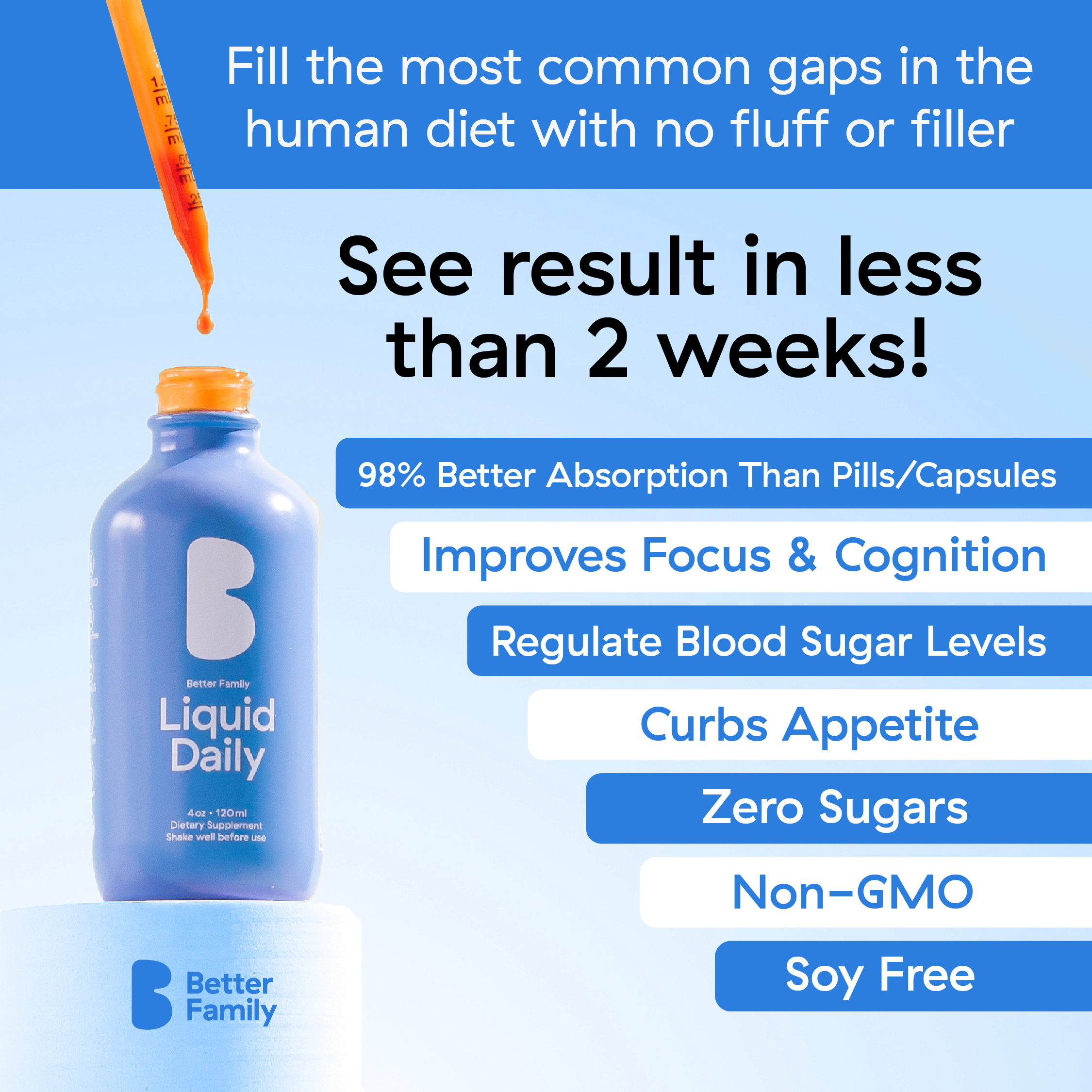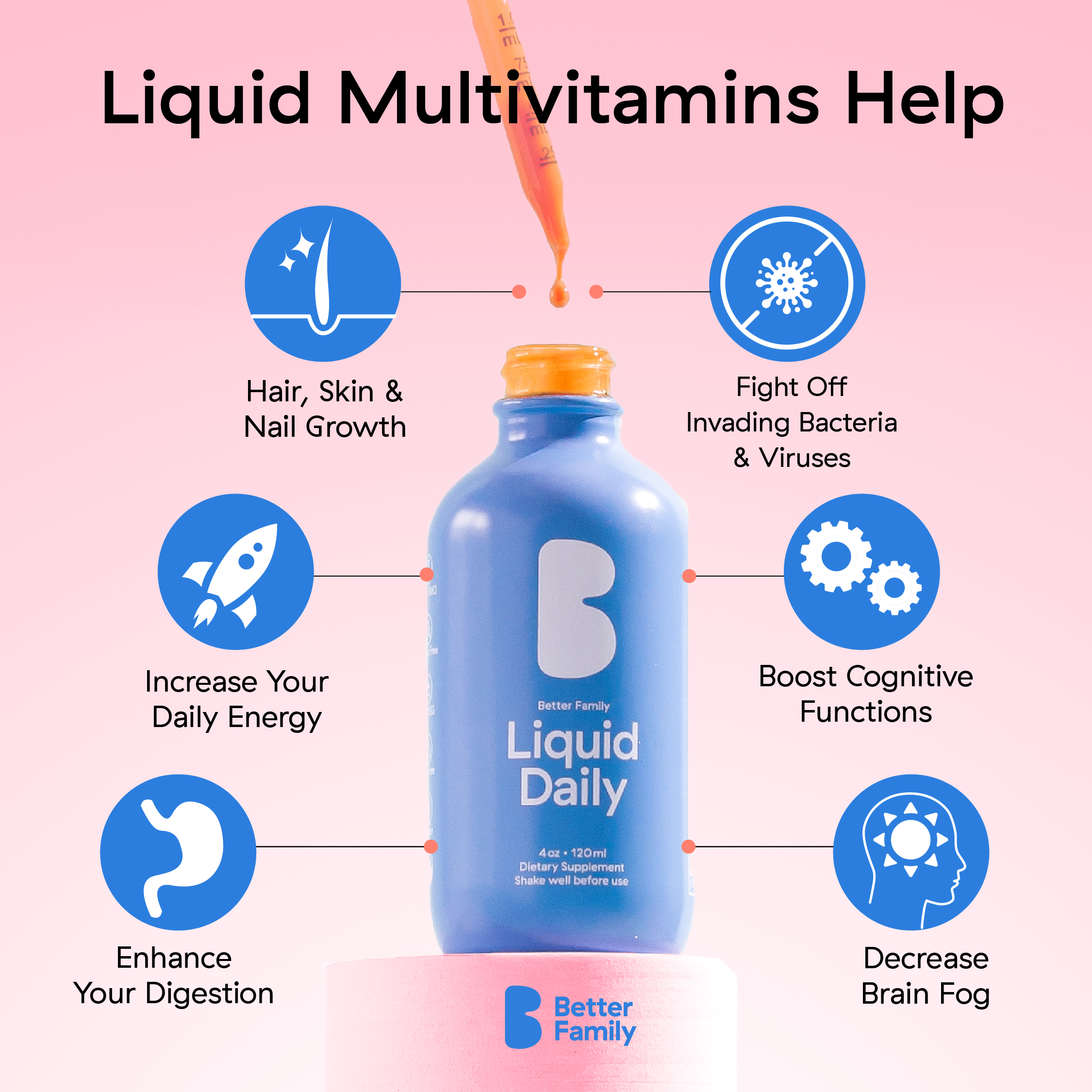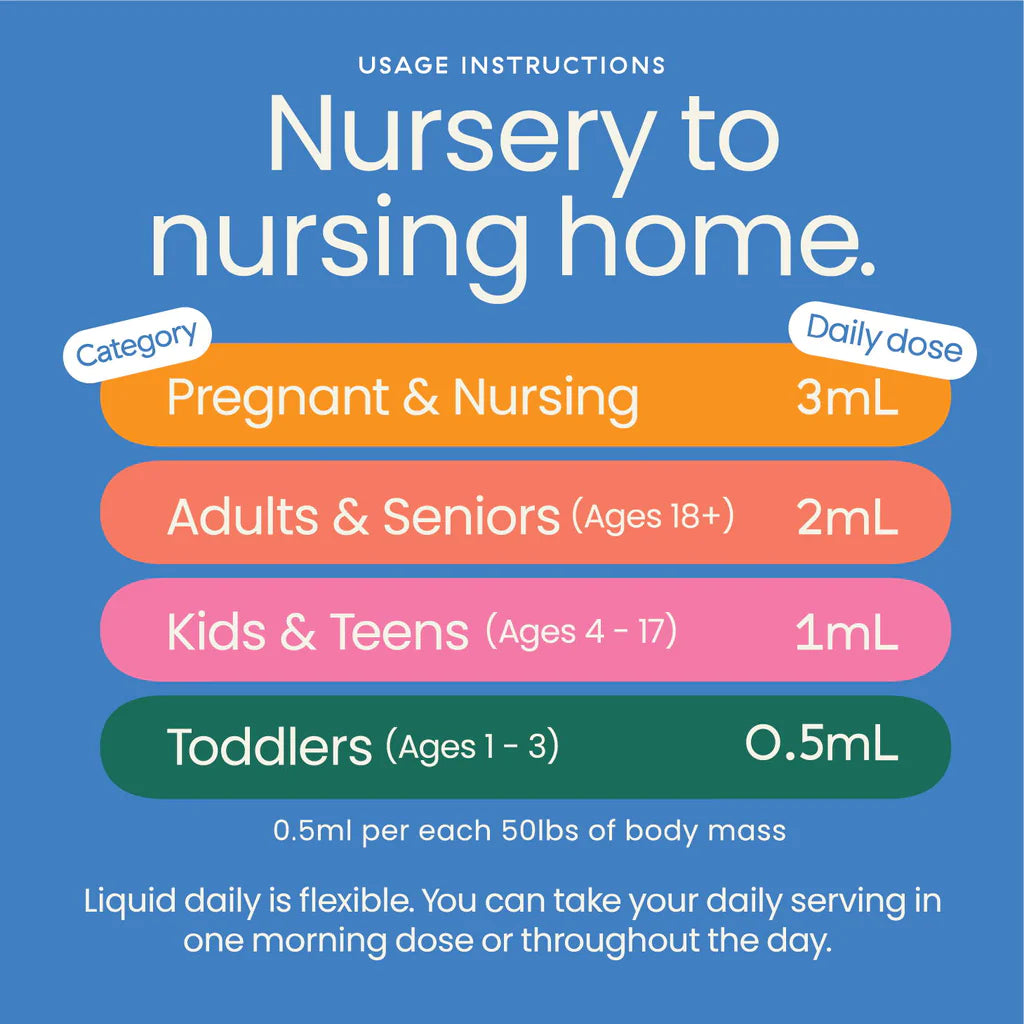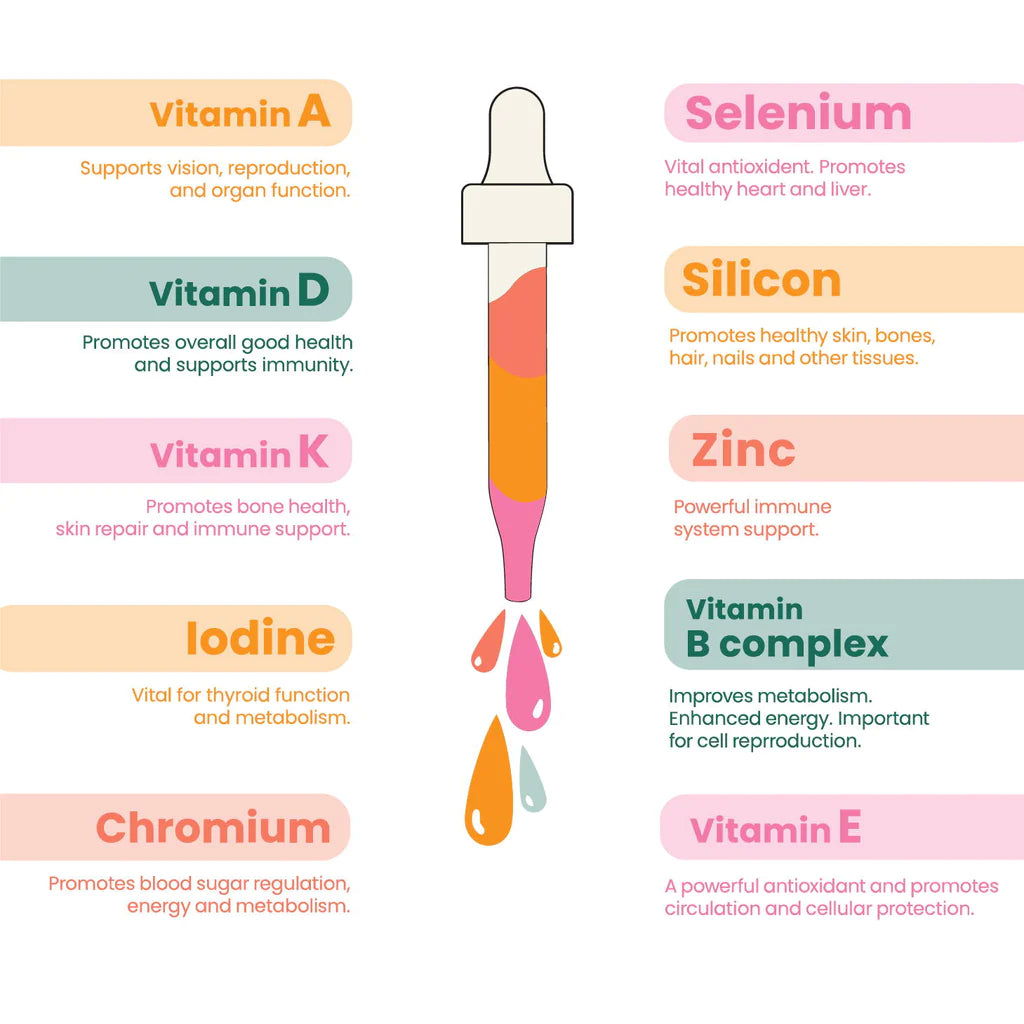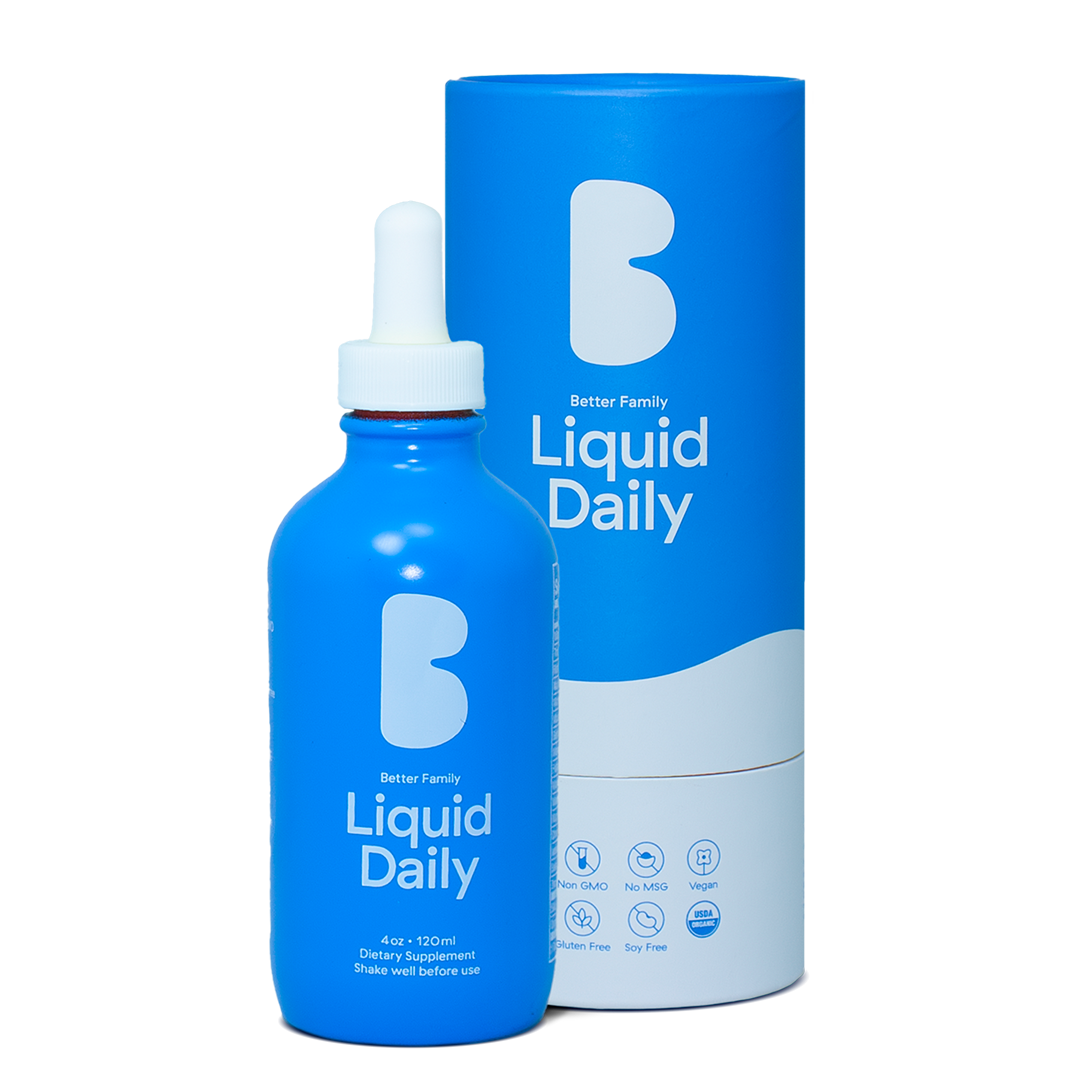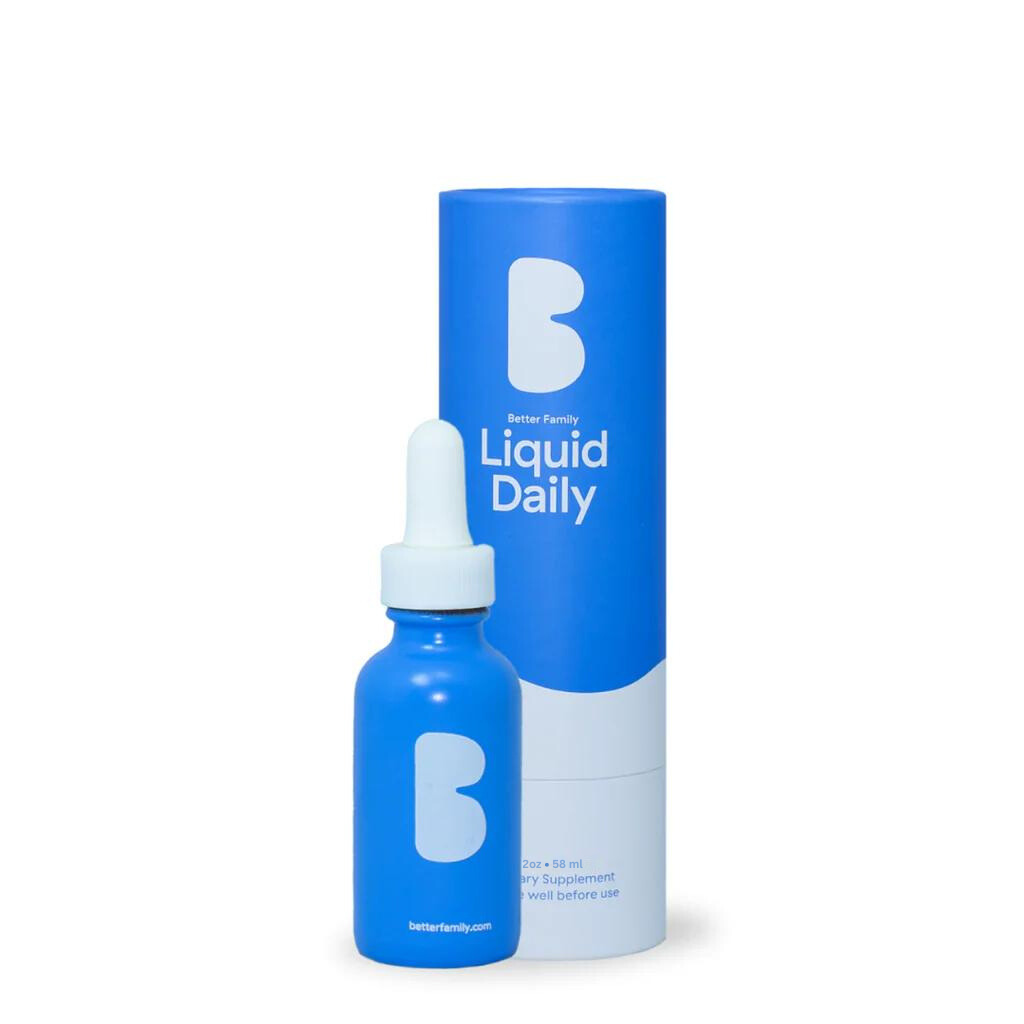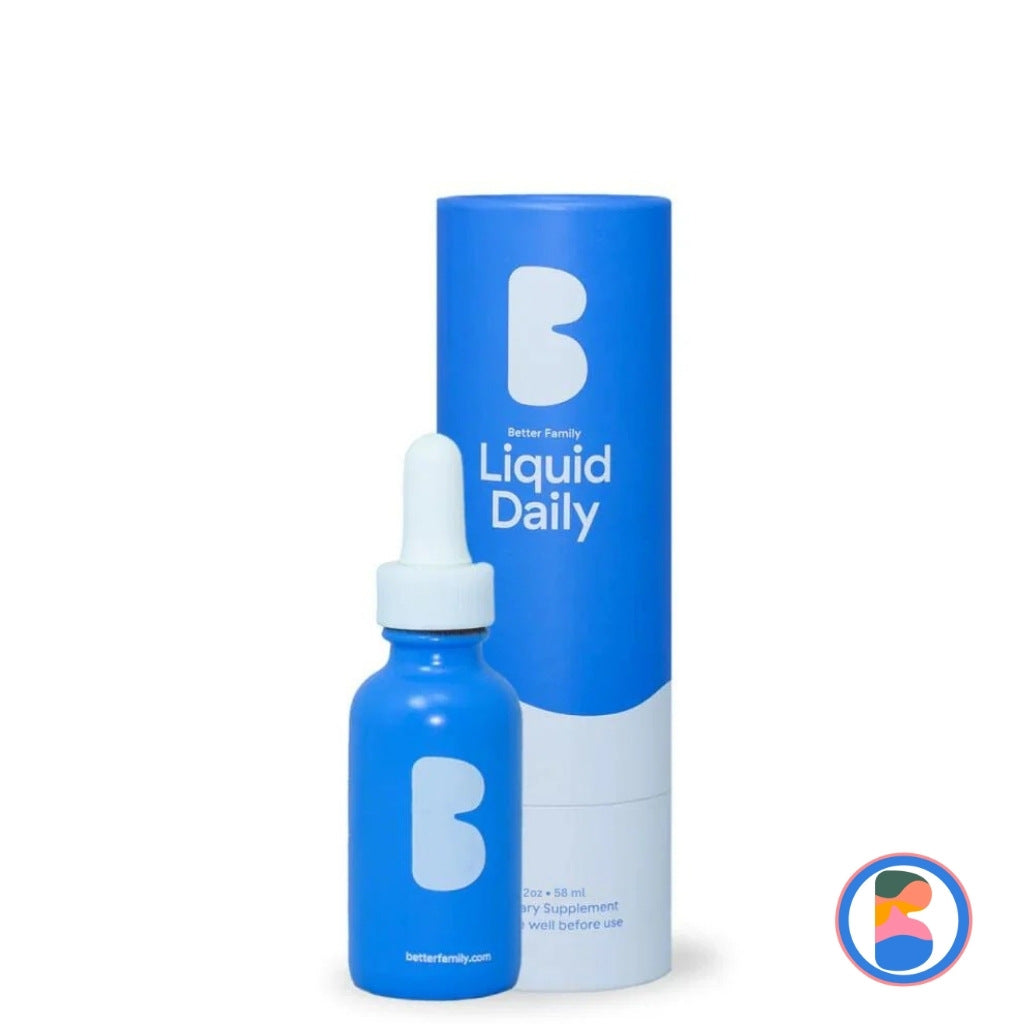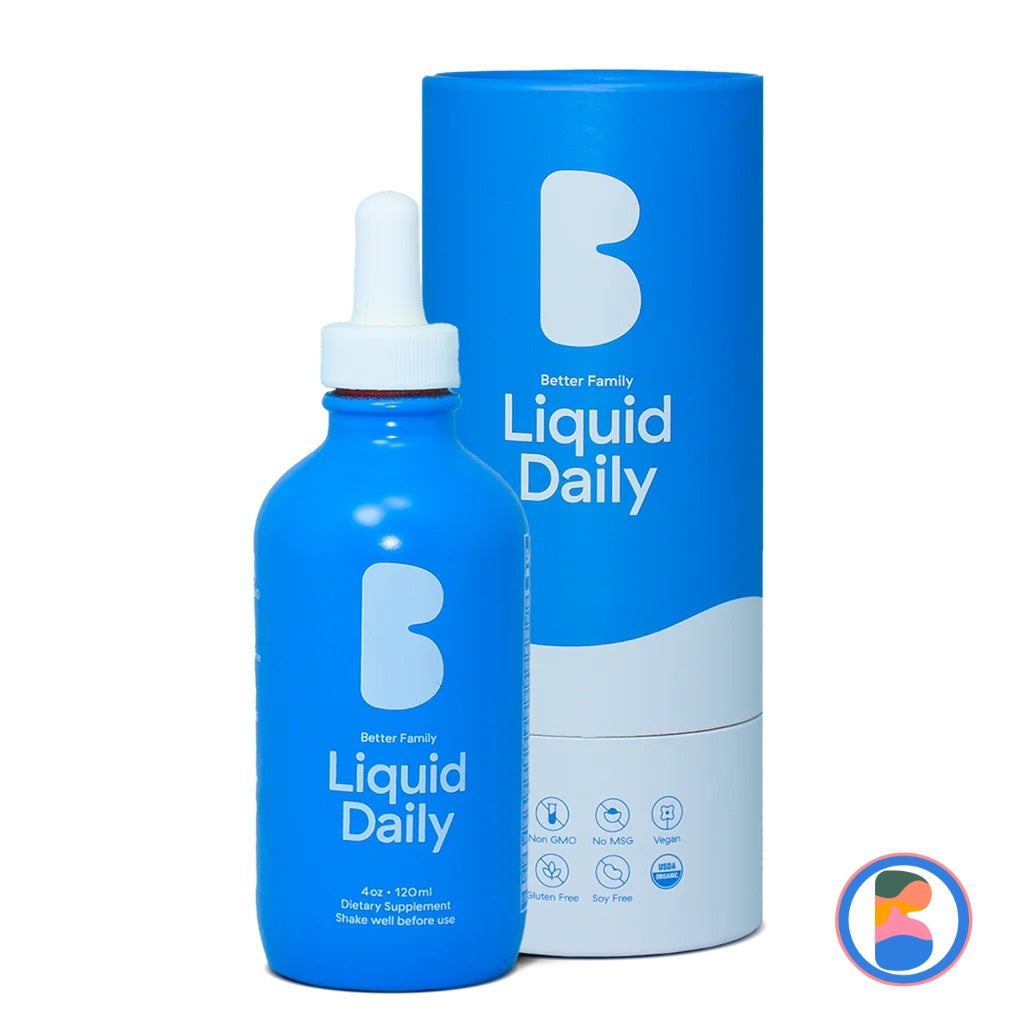Better Family Article Series
Liquid Multivitamins
The Absorption Advantage
This article series is brought to you by the team behind Liquid Daily: the better option for filling nutritional gaps in your household.
Liquid Is Better
Simplify Your Routine
You're In Control

Article Highlights
- The best multivitamin might include a blend of vital nutrients such as vitamins A, B complex, C, D, E, and K, as well as minerals like calcium and zinc, among others.
- Vitamins are organic compounds required by our bodies in small amounts for various physiological processes.
- Liquid Daily, as one of the best liquid multivitamins for adults, provides a balanced combination of vital nutrients that may be lacking in a typical diet.
Best Vitamins To Take Daily
What supplements should I take daily? What vitamins should I take every day? This can be a complex question. The quest for optimal health and well-being is a noble pursuit, and the best vitamins to take daily can provide essential nutrients that contribute significantly towards achieving this goal.
The best multivitamin might include a blend of vital nutrients such as vitamins A, B complex, C, D, E, and K, as well as minerals like calcium and zinc, among others. While multivitamins inherently offer numerous benefits by combining essential nutrients into one convenient form, it is crucial to understand the specific vitamins that should be incorporated into one's daily routine based on individual requirements.
A fundamental aspect of this inquiry involves answering the question, "what vitamins should I take every day?" In order to do that, it can be helpful to first answer the question, “What are the 13 types of vitamins?”
Vitamins D and C are particularly noteworthy owing to their central role in supporting immune function. Vitamin D is imperative for its ability to facilitate calcium absorption, which helps maintain bone density and prevent osteoporosis. Vitamin D also plays an instrumental role in modulating cell growth and reducing inflammation, thereby producing far-reaching effects on various bodily systems.
The importance of Vitamin C cannot be overstated either, as it serves as an antioxidant powerhouse that combats free radicals while also stimulating collagen production for healthy skin and connective tissue.
Additionally, B-complex vitamins consisting of eight distinct compounds (B1 - thiamine; B2 - riboflavin; B3 – niacin; B5 - pantothenic acid; B6 - pyridoxine; B7 – biotin; B9 – folate and B12 - cobalamin) play an indispensable role in myriad cellular processes such as DNA synthesis, enzymatic reactions, and energy metabolism. These vitamins are vital for maintaining optimal brain function, promoting a healthy nervous system, as well as supporting cardiovascular health.
Identifying the best vitamins to take daily necessitates an evaluation of one's individual needs and preferences in conjunction with expert guidance. The ideal multivitamin should encompass a diverse range of essential nutrients that work harmoniously to promote overall health and wellness.
"Incredible product. Has helped with sleeping and clarity at work. I would recommend for everyone. Very easy to use also."
- Paul E.
Start feeling better with Liquid Daily - the liquid multivitamin packed with 18 essential nutrients & vitamins.
TRY LIQUID DAILYWhat Vitamins Should I Take
Which vitamins are the most important for each individual can vary depending on their needs and diet. However, some essential vitamins and supplements can be beneficial for most people. So, rather than asking what are the 3 most important vitamins, or which vitamins should I take daily, it may make more sense to ask which vitamins am I specifically deficient in? To answer that question, it may be necessary to visit your doctor.
So, what are vitamins? Vitamins are organic compounds required by our bodies in small amounts for various physiological processes. Some are antioxidants that protect cells from damage, while others help convert food into energy or contribute to cell growth and repair.
Minerals, another group of essential nutrients, are inorganic substances needed for a variety of bodily functions, such as maintaining proper fluid balance or aiding in muscle contractions.
Some supplements offer various types of nutrients combined. These products can contain various combinations of vitamins, minerals, herbs, enzymes, amino acids, or other substances intended to supplement one's diet and enhance overall health. Some key vitamins and minerals that are commonly recommended for daily intake include:
- Vitamin D:
This fat-soluble vitamin plays a vital role in calcium absorption and promotes healthy bone growth. It also helps maintain immune system function. - Calcium:
A mineral critical for building and maintaining healthy bones and teeth; it is also necessary for blood clotting, muscle contractions, and nerve function. - Vitamin C:
An antioxidant that supports immune function, collagen production (vital for skin), and wound healing process; it also aids iron absorption from plant-based sources. - B-vitamins:
A group of eight water-soluble vitamins that aid in energy production, red blood cell formation, and proper neurological function. - Omega-3 fatty acids:
These essential fats have been shown to support heart health, brain function, and reduce inflammation.
It is pertinent to note that before adding any vitamins or supplements to one's daily regimen, consultation with a healthcare professional is highly recommended. This ensures an individualized approach based on specific needs and any pre-existing medical conditions. In conclusion, understanding the significance of various vitamins and minerals is imperative when determining "what vitamins should I take." Coupled with tailored advice from healthcare professionals, individuals can make informed decisions regarding their daily supplementation for optimal health benefits.
Essential Vitamins And Minerals
Essential vitamins and minerals are the fundamental nutrients that our body needs to function correctly. They play a vital role in maintaining optimal health, aiding in various bodily processes like growth, development, metabolism, and immunity. Our body cannot synthesize these essential nutrients on its own; therefore, we must obtain them through our diet or supplements.
There are a number of important nutrients humans need. These include vitamin A for vision and immune support, vitamin C for collagen production and antioxidant properties, vitamin D for calcium absorption and bone health, vitamin E as an antioxidant to protect cells from damage, and the eight B-complex vitamins (B1, B2, B3, B5, B6, B7, B9 and B12) which assist with energy production and red blood cell formation.
In addition to these essential vitamins, there are many essential minerals required by our bodies. Some vital minerals include calcium for strong bones and teeth; iron for carrying oxygen in our blood; magnesium for muscle relaxation and nerve function; potassium for fluid balance and nerve transmission; sodium for regulating blood pressure; and zinc for immune system support.
While all vitamins play crucial roles in different aspects of human health, there are three most important vitamins that warrant special attention: vitamin C, vitamin D, and vitamin B12. Vitamin C is a potent antioxidant that protects the body against free radicals while promoting healthy skin by synthesizing collagen. It also plays a significant part in boosting immunity levels by assisting white blood cells' function.
Vitamin D is thought to aid the absorption of calcium in the body, which is necessary to maintain strong bones throughout life. Moreover, emerging research points towards its role in supporting the immune system as well.
Vitamin B12 stands out among other essential vitamins because it is involved in nerve function maintenance, besides being critical to red blood cell production. This nutrient can become increasingly important as people age, with some studies linking its deficiency to cognitive decline and memory issues.
Essential vitamins and minerals are indispensable nutrients that our body needs to function properly. Each of these 13 types of vitamins and myriad minerals plays a unique role in maintaining overall well-being. Ensuring an adequate intake of the three most important vitamins - vitamin C, vitamin D, and vitamin B12 – is crucial for optimal health. A balanced diet rich in fruits, vegetables, whole grains, lean protein sources, and healthy fats can help provide all the necessary nutrients needed by our bodies.
Try Liquid Daily
Liquid Daily is the all-in-one liquid multivitamin that contains the highest quality formats of the most important vitamins and minerals.
- 18 Essential Vitamins & Minerals
- Advanced Liquid Absorption
- Zero sugars, fillers, or artificial flavorings
- Safe & Effective for Kids & Adults!
Vitamins For Tiredness And Depression
Vitamins for tiredness and depression are increasingly becoming a popular solution for individuals seeking to alleviate the physical and mental fatigue that plagues their daily lives. A well-balanced diet, regular exercise, and proper sleep schedules can be crucial for maintaining overall health, but incorporating essential vitamins into one's daily routine can address specific issues related to stress, fatigue, and depression. Before starting any new supplement regimen it is crucial to discuss the matter with your doctor.
Vitamins for tiredness and stress might play a key role in boosting energy levels or keeping anxiety at bay. B vitamins, particularly vitamin B6 (pyridoxine), vitamin B9 (folic acid), and vitamin B12 (cobalamin), are vital in regulating the nervous system function. These nutrients help convert food into energy while also promoting neurotransmitter synthesis—essential chemicals that relay signals between nerves.
When considering vitamins for tiredness and depression, it is important not to overlook the significance of vitamin D. Often referred to as the "sunshine vitamin," vitamin D is synthesized in our skin upon exposure to sunlight. Vitamin D deficiency is common in individuals who spend most of their time indoors or live in regions with limited sunlight exposure.
Studies have demonstrated a correlation between low levels of this vital nutrient and depressive symptoms. The best tonic for tiredness and fatigue might ideally include essential minerals such as magnesium, potassium, iron, and zinc, along with above-mentioned vitamins. Iron deficiency anemia is a common cause of chronic fatigue; thus, incorporating iron-rich foods or supplements into your diet can, in some cases, improve energy levels.
Some of the most important vitamins for the immune system include vitamin C, vitamin D, and vitamin E. A comprehensive approach towards tiredness and depression may involve addressing nutritional deficiencies through the inclusion of essential vitamins and minerals. A diet rich in B vitamins and vitamin D accompanied by vital minerals like iron and magnesium can significantly improve energy levels, mood regulation, stress management, and immune system functioning.
Best Supplements To Take For Overall Health
Among the plethora of options available, it’s natural to wonder about the best supplements to take for overall health and which vitamins should be consumed daily. This in-depth exploration will shed light on these questions and provide valuable information about key supplements that can significantly improve one's well-being.
One of the essential aspects of maintaining good health is ensuring that our bodies receive all the necessary nutrients. However, due to various factors such as dietary restrictions, lifestyle choices, or pre-existing conditions, it might become challenging to obtain all the required vitamins and minerals through food alone.
That's where supplements can come into play—by filling nutritional gaps and providing additional support to our bodies. When considering which vitamins should be taken daily, a good starting point is focusing on those that cater to overall health rather than targeting specific systems or functions.
Vitamin D, for example, plays an important role in immune function, bone health, and even mental well-being; thus, its supplementation becomes crucial—especially for those living in regions with limited sun exposure or following a plant-based diet.
Another vital nutrient is Vitamin C, known for its antioxidant properties and support towards our immune system as well as skin health. Additionally, Omega-3 fatty acids might be considered among the best supplements to take for overall health due to their anti-inflammatory properties and contribution towards heart and brain function. These essential fats can be found predominantly in fish oil or algae-based supplements—making them suitable options for both omnivores and vegetarians alike.
For individuals aiming at improving their gut health—an important aspect often overlooked—a high-quality probiotic supplement can work wonders. Probiotics help maintain a balanced gut microbiome by introducing beneficial bacteria that aid in digestion while boosting immunity at the same time.
Finally, incorporating a well-formulated multivitamin into one's daily regimen can prove beneficial in covering any deficiencies arising from an inadequate diet. A multivitamin that comprises essential vitamins, such as A, B-complex, C, D, E, and K—along with vital minerals like zinc and iron—can provide comprehensive support to the body.
While there's no one-size-fits-all answer to the best supplements for overall health or which vitamins should be taken daily, some key contenders deserve serious consideration. These include Vitamin D, Vitamin C, Omega-3 fatty acids, probiotics, and a high-quality multivitamin. By incorporating these supplements into one's daily routine while maintaining a balanced diet and lifestyle choices—one can embark on a journey toward optimal health and well-being.
"This is the first liquid multivitamin that I personally believe provides all of the essentials we need via a proven delivery method that will aide in combatting deficiencies."
- Adam C.
Try the lightly and naturally flavored liquid multivitamin - the perfect blend of essential nutrients, including methylfolate.
TRY LIQUID DAILYMore articles from Better Family


